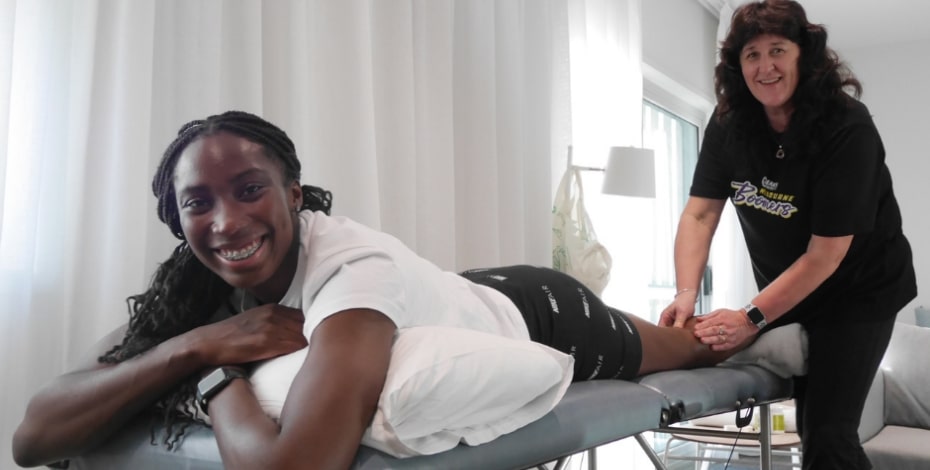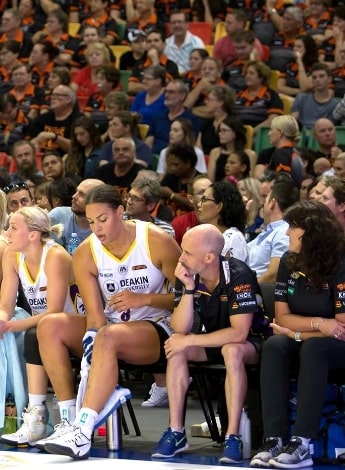
Parallel lines

Gaylene McKay is the physiotherapist both for the Australian women’s national basketball team the Opals and for the Melbourne Boomers, the team she also played in for seven years. A conversation about her parallel careers in physiotherapy and basketball.
This year marks APA Sports and Exercise Physiotherapist Dr Gaylene McKay’s 30th year as the team physiotherapist for the Melbourne Boomers (formerly known as the Bulleen Boomers).
Gaylene also played for the Boomers, and before that for the Nunawading Spectres, in a Women’s National Basketball League (WNBL) career spanning 17 years and 338 games.
Since 2017, she has also been the head physiotherapist for the Opals, the Australian women’s national basketball team, most recently travelling to Tokyo with the team for the Olympic Games.
‘I was involved in the WNBL as a player from the time it started, so that’s been a 40-year involvement as player or physio,’ Gaylene says.
Gaylene’s introduction to physiotherapy came at 16 years old, when, as a player for Nunawading, she got her first significant injury, to her ankle.
With no team physiotherapist to treat her, she found Jill Cook (now a professor in musculoskeletal health at La Trobe University) in the Yellow Pages and her interest in physiotherapy was sparked.
‘I saw the players around me being injured and the thought of actually being able to help those players, help them return to court and return to playing their best, was something that really attracted me to becoming a physiotherapist.
'So when I finished high school I went directly to the physio course,’ Gaylene says.
‘I did my physio studies in parallel with playing WNBL, so it was a very busy portion of my world.
'But then, the two have always been in parallel along the way.’
Jill Cook later became Nunawading’s team physiotherapist and Gaylene closely watched how she interacted with the players and how she worked.
And when she moved from Nunawading to the Bulleen Boomers, she volunteered to be their team physiotherapist, a post she has held ever since.
Gaylene says that being both a team member and the team’s physiotherapist was challenging at times, especially if one of the other players was injured while she was on court playing.
‘We were playing against the Australian Institute of Sport down here in Melbourne and, unusually for the AIS, they didn’t bring a physio down and one of their players dislocated a finger.
'The referees were saying, “Where’s your team physio?” to the Bulleen bench and they said, “There she is, she’s on the court.”
'So they called a referees’ timeout while I went and reduced the finger, strapped it and suggested they have an X-ray after the game, then the timeout ended and the game played on,’ she says.
It was often a balancing act, especially at half-time, when she would be trying to listen to the coaches’ instructions and also deal with her teammates’ injuries.
‘We were on a road trip and one of my teammates had done an ACL injury, which I assessed while listening to the coaches.
'I instructed them not to go back on court.
'During the second half I’m running down the court to find this player doing her own self-assessment, hopping, running, thinking she might come back out on the court.
'So I’m running down the sidelines to tell the assistant coach to get her to sit back down and that she won’t come back on,’ Gaylene says.
On the positive side, however, she knew about every little injury sustained by her teammates.
Being the only team physiotherapist while she was playing also meant she had to treat her own injuries courtside.
‘I tore a calf in the latter stages of my basketball career.
'I knew I couldn’t continue with the game.
'Afterwards I came back to my clinic and I said to one of my physios, “Pretend I’m not a physio and tell me what to do.”
'I took those decisions out of my own hands because as a physio, sometimes you think you can fast-track; you think you know exactly what you need to do.
'As physios, when we injure ourselves, actually getting someone else to take care of you is a good thing,’ Gaylene says.

Gaylene McKay (far right) on the sidelines at a WNBL Boomers game.
Gaylene joined Alphington Sports Medicine Clinic as a young physiotherapist in 1991, continuing her long association with founder Jill Cook.
She has managed it since 1995, balancing her role there with her involvement in elite sport.
Gaylene also found time to complete a PhD in physiotherapy at La Trobe University, focusing on basketball injuries and recurrent ankle injuries, graduating in 2003.
But while she decided not to pursue a career in research, preferring to remain focused on elite sport, she continues to dabble in it, with a soon-to-be-published paper from her involvement in a calisthenics research project.
Calisthenics is another sport Gaylene works with at an elite level, due to her daughter’s involvement in calisthenics as an elite competitor.
‘I could see there were things that needed to be done in injury prevention and management in the sport.
'I spoke to Calisthenics Victoria about it and they opened the doors and welcomed me in to help them along their journey with becoming better at their injury prevention and management as well,’ she says.
The PhD has also led to other opportunities, Gaylene says, including a longstanding involvement with WorkSafe and the Transport Accident Commission (TAC) in Victoria.
‘I think my PhD certainly helped me open the door to get work on the WorkSafe and TAC clinical panels.
'And certainly undertaking a PhD helps that analytical mind and I think that’s always been a valuable trait and skill to develop.’
But for Gaylene, it always comes back to basketball.
She juggles her clinical work and managing Alphington Sports Medicine Clinic around her commitments to the Opals and the Melbourne Boomers.
‘Whether I’m working with the Boomers or Opals, the team that comes together is often distributed right around the world.
'You need to be aware of injuries and you’re managing these from afar.
'So you have to become good at communicating with people all around the world, just making sure you can put the best care in place for when the players come here for the season or the tournament they may be playing,’ she says.
Athlete care has changed a lot since Gaylene was playing in the 1990s.
There is a much bigger support team around the players, including doctors and physiotherapists, strength and conditioning coaches, massage and more.
It’s a much more holistic approach to treatment and Gaylene says it’s nice to be able to work collaboratively to get the best outcomes for the players.
Another change has occurred as women’s basketball has moved towards being a fully professional sport at the elite level.
‘In my era there was pretty much no payment or a very small payment, so there was always other work alongside it.
'Now there’s a big group of players where it’s their full-time employment.
'When you manage these elite basketball players’ injuries now you also have to manage the psychosocial pressures that might impact on their recovery—almost comparable to injured workers—that fear of whether they’re going to be able to return, can they do their next contract, what does this mean for their long-term work?’ Gaylene says.
It’s an approach she has become familiar with through her role on the WorkSafe Clinical Panel, undertaking clinical reviews and providing clinical and rehabilitation support and advice to claims staff and healthcare providers.
‘That knowledge of the psychosocial management of injuries has been very important in moving with the changes of how we manage players’ injuries these days,’ Gaylene says.
Gaylene has been around for some pretty big basketball achievements over the years: her own six championships as a player with the Nunawading Spectres, captaincy of the Boomers for her last three years on the team, the Boomers WNBL title in 2010/11, the Opals’ silver medal at the 2018 World Cup and, of course, attending the Tokyo Olympic Games with the Opals.
But she says it’s the many small highlights over the years that stay with her.
‘Every injured player I helped to get back on the court to achieve their basketball career goals is a real highlight for me.
'Being involved in the game for so long, the highlights have been helping players and building such great friendships and relationships,’ she says.
The 2021/22 WNBL season is scheduled to commence on 2 December.
Main image: physiotherapist Gaylene McKay and Boomer Ezi Magbegor.
© Copyright 2024 by Australian Physiotherapy Association. All rights reserved.





